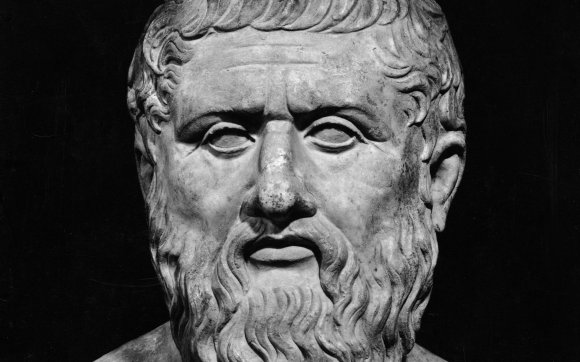Abolition of private property, children raised by the State and ban on painting. The first ever political utopia sounds like the worst totalitarian nightmares. However, the idea of the State as proposed by Plato contains several elements that today could inspire not only politicians, but also company directors.

The starting point for our analysis of Plato’s (427-347 BC) thoughts on politics is the question of what people need the State for in the first place. According to Plato, people cannot leave ‘outside the State’ as no one can individually achieve self-sufficiency (referred to as autarchy). The State is, therefore, like a company – an organisation whose members are all interconnected. Plato insisted that is should be organised in a way that would guarantee maximum efficiency. Without further ado, let us take a closer look and explore Plato’s metaphor of the State = Company.
In his vision of the State Plato singled out two classes which he considered of paramount importance: Warriors and Guardians – the latter being philosophers. Translated into the corporate domain, the key to the development of an organisation are its managers.
The majority of the members of an ideal state would, of course, be its rank and file – farmers, artisans and traders, satisfying the needs of citizens during times of peace. According to Plato, such common tasks required nothing more than simple technical skills, which is why the philosopher paid little attention to them. Plato, therefore, would be seen today as an advocate of a not-quite-egalitarian view, according to which strength of a business organisation has little to do with its rank-and-file staff. Of much greater importance should be soldiers and guardians – or managers, as we would see them today – and much more is required of them. Plato proposed a complex system of education for these two groups, for whom he also advocated abolition of private property and tight control over procreation. What were the origins of these totalitarian, by modern standards, restrictions and why should common people be exempt from them?
Political leaders should be chosen from among philosophers, who can reach beyond everyday problems and capture their essence. Assuming the corporate perspective, the above means that the management have received extensive education and having perfectly delegated all responsibilities, they are left with ample time and attention to identify and solve problems at the root level.
In order to get a clear picture of the situation, we should begin with the metaphysical foundations of Plato’s proposition. The philosopher recognised the existence of two realities: one that is material and imperfect, which we explore through senses, and the other one – immaterial, which is accessible to people through reasoning. The spiritual world is the world of timeless and unchangeable ideas, which are reflected in the material world constructed by God (demiurge). The crucial challenges the State (or a company) is facing require an insight into the ideal world. The company leader should break with the routine and the mundane – delegating these to common workers, and, instead, focus on great projects that do not seem to carry much weight from the perspective of everyday practicalities.
To illustrate it, Plato used the famous allegory of a cave, at the entrance to which various objects have been placed so that people closed inside the cave could only see their shadows on a wall. In corporate reality, this would more or less mean that one should aim to eliminate any preoccupation with matters of only superficial importance.
Matter is a substance that has its flaws, therefore insofar as there exists a model of perfect man in the ideal world, the actual people created in its image have various faults, of which the fundamental one is our (human) mortality. However, according to Plato, the mortal human body is inhabited by immortal soul, which used to reside in the world of ideas but was sent to Earth as a punishment for the evil deeds it committed. Thus, the goal of our earthly life is to liberate our souls. Under this scenario, with farmers making sure the bodies of citizens know no hunger, guardians should, first and foremost, take good care of people’s souls.
Individual projects and tasks are, under this approach, only a shadow of the real idea – that is: the strategic goals of the company and its business philosophy. Successful managers cannot lose sight of these fundamental principles for any amount of time, while ‘taking care’ of employees’ souls means keeping them aware that end-of-month results are not an end in themselves but an element of a larger strategic concept which the company should pursue.
All the strict restrictions imposed on guardians–philosophers were therefore meant to protect them against corruption. In the context of contemporary business culture it should mean the introduction of proper systems of management complemented with bonus schemes to ensure that managers do not put their own interests above those of the organisation.
Thanks to the abolition of private property, they were supposed to avoid being attracted to the pursuit of riches. Taking children from biological parents and raising them by the State would, according to Plato, prevent conflicts and fights between families, ensuring that the guardians-philosophers would treat all citizens as their relatives. Finally, the ban (or, rather, censorship) imposed on artistic expression was to keep artists safe from drifting into the world of phantasmagoria known from paintings and poems.
The key to being a good manager are the four cardinal virtues, which should be persistently honed. It seems that managers should be characterised, and still rightly so, by WISDOM, COURAGE, MODERATION and JUSTICE.
So even if the means Plato proposed in his utopia seem to be, from the modern perspective, the ultimate aberration, the aims behind these means sound quite reasonable even today. A good leader, whether a politician, company president or military commander, will certainly recognise the relevance of the four cardinal virtues which, according to Plato, leaders should demonstrate. Firstly, prudence – here seen as knowledge of conduct appropriate for a particular situation. Secondly, fortitude – i.e. the ability to remain calm and composed not only when faced with a threat or danger, but also – when steering clear of excessive euphoria or other passions. Thirdly – temperance, which means being disciplined and knowing one’s place and status in hierarchy, without unjustified modesty or gratuitous arrogance. Finally – justice, which is understood as proper recognition of one’s skills and doing exclusively what one has been appointed to, without biting off more than one can chew on the one hand, or attending to trivial matters on the other.
The ideal CEO by Plato would therefore just focus on great visions and completely ignore all of the day-to-day corporate routine. He – or she – would perhaps not be great fun to talk to during corporate events, but, equally, would not panic over all those minor hitches that trouble us on a daily basis. Such a CEO would be a demanding boss on the one hand, yet a good one on the other as guardians, in Plato’s view, should expect more of themselves than of others.
-
About Us
-
Product
Customer Data Platform
Campaigns Management
Omnichannel Execution
-
Resources
Knowledge Center
Affiliation Program
-
Pricing
-
Become a Partner
-
Career
-
Community




 Follow
Follow


![[New Feature] Shine the light on your hidden visitors with Spotlight](https://blog.salesmanago.com/wp-content/uploads/2024/04/1-9.png)


![[New Feature] Unlock Deep Behavioral Personalization with Product Collections](https://blog.salesmanago.com/wp-content/uploads/2024/03/1-3.png)



![[New Feature] Shine the light on your hidden visitors with Spotlight](https://blog.salesmanago.com/wp-content/uploads/2024/04/1-9-1024x536.png)







